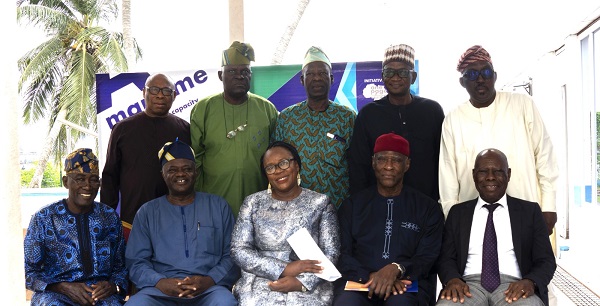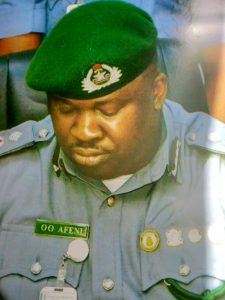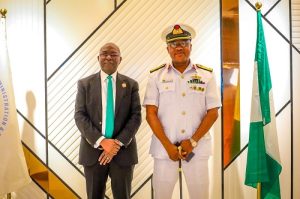Safety Measures Onboard Ships, Training Dominate Discussions as Master Mariners, Engineers Meet in Lagos

Seated L-R: Engr. John Oguntokun; Captain Ade Olopoenia; Dr. Hope Orivr, PhD.; Captain Emmanuel Iheanacho; Engr. Richard Owolabi, and standing L- R: Captain Iheanacho Ebubeogu; Captain Tajudeen Alao; Captain Adewale Ishola; Engr. Kato Abuja, and Engr. Hakeem Oderinde, at the Waterside Centre unveiling.
• Hold forum in honour of late Chris Asoluka
• As Maritime Journalist, Hope Orivri, launches Waterside Centre in Apapa
By Francis Ugwoke
Master mariners and engineers on Thursday gathered in Lagos to discuss crucial issues affecting the nation’s maritime industry.
The forum was part of the unveiling of The Waterside Centre at the Mission to Seafarers in Apapa, established by a Maritime Journalist, Dr. Dr. Hope Orivri.
The industry experts pointed out the need for safety measures on board ships as well as enhanced training for seafarers in the interest of the nation’s economic development.
Former Minister of Interior, Capt Emmanuel Iheanacho, who is also the Chairman of the Waterside Centre, while explaining that the Symposium by the master mariners and engineers was in honour of a maritime stakeholder, Chief Chris Asoluka, who passed on recently, spoke on safety protocols in maritime operations as vital for the industry.
Iheanacho emphasized that implementing robust safety protocols onboard ships is crucial to reducing accidents and ensuring crew safety and welfare.
According to him, a comprehensive safety program should cover various aspects, including safety protocols which include risk assessment, safety procedures, training and drills, personal protective equipment and safety inspections,
He advised, “Conduct regular risk assessments to identify potential hazards and implement controls to mitigate them, develop and implement safety procedures for various onboard activities, such as cargo handling, navigation, and emergency response, provide regular training and drills for crew members to ensure they are familiar with safety procedures and equipment, ensure that Personal Protective Equipment ( PPE) is available and used correctly by crew members, conduct regular safety inspections to identify and address potential hazards, establish a system for reporting incidents and near-misses, and use this information to improve safety protocolse, establish a safety committee to oversee safety protocols and promote a safety culture onboard”.
On crew safety and welfare, Iheanacho called for fatigue management, adding that there should be policies to ensure crew members get adequate rest and breaks.
On the health and wellbeing of seafarers, he said the seafarers should have access to medical care and promote healthy living.
In his paper titled Training and Development – Investing in Maritime Workforce Development to Bridge the Skills Gap in the Face of Emerging Technologies, Head of Technical at the Memorandum of Understanding on Port State Control for West and Central African Region (Abuja MoU), Engr Richard Owolabi, emphasized that training and development of individuals and groups within organizations remain crucial for enhancing performance.
Owolabi said a systematic approach, focused on skills, methodologies, and content, is essential for achieving organizational objectives.
According to him, “training and development are incomplete without proper monitoring. Monitoring can be conducted through the evaluation of both the instructor and attendees. Instructor evaluation can be done through feedback or ratings, but attendees can be evaluated through internal or external certifications or scores”.
On training approaches, he recommended “Competency-Based Training (CBT): Focused on real-life, job-specific skills, Simulation-Based Learning: Use of VR/AR for ship bridge and engine room simulation, E-learning & Hybrid Training Models: Flexible learning paths, including mobile-friendly platforms, Apprenticeships & Industry Partnerships: Align training with evolving industry standards, Soft Skills Development: Communication, critical thinking, adaptability, collaboration across cultures”.
Owolabi called on all stakeholders to invest in maritime academies, policy reforms, public-private training partnerships, adding that the “success of maritime digital transformation is not solely dependent on technological factors; it is also contingent on human factors. Investing in human capital today ensures that the maritime workforce of tomorrow will be agile, resilient, and well-prepared”.
Maritime Journalist and the Chief Executive Officer of Waterside Centre, Dr. Hope Orivri, explained that the idea was part of the desire to bring critical maritime stakeholders together as one community to discuss industry related challenges.
Orivri who is also the Publisher of One Page Africa online newspaper, said the Watrerside Centre is to serve as a hub for knowledge sharing as well as mentoring.
According to her, “The gathering for today actually is the unveiling of our maritime community hub which is tagged the Waterside Centre. You may ask why the Waterside Center? We know in the maritime industry there are very many stakeholder engagements, people gather for several kinds of meetings and hold conferences.
“The Waterside Center is looking at creating a community for social interaction among people who have maritime as their primary interest. One key thing for the Waterside Center is mentorship for young seafarers, port operators, boat operators and to even learn the indigenous knowledge from local operators and equally enlighten residents in the coastal communities. The centre will provide an enabling environment for youths to better understand the marine and blue economy. ”
The President of Nigerian Association of Master Mariners (NAMM), Capt. Tajudeen Alao, applauded the Chairman of Waterside Centre, Capt. Emmanuel Ihenancho and the CEO, Orivri for establishing the Centre, describing it as a reality dream he had nursed for the industry like the popular Aviation Industry Roundtable.
Among those who attended the programme were former President of the NAMM, Capt. Ade Olopoenia; a member of the management team of MTS Lagos/ Chairman, NPCC Committee on Port Operations and Logistics, Capt. Ihenancho Ebubeogu; another former President of NAMM, Capt. Adewale Ishola; Secretary, Association of Marine Engineers and Surveyors (AMES), Engr. Kato Abuja; Engr. Akeem Oderinde and Engr. John Oguntokun.





